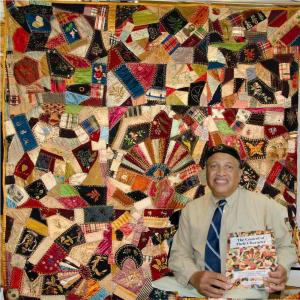
Author and Historian John Allen Recently Featured on Close Up Radio
PERRIS, CA, UNITED STATES, April 21, 2025 /EINPresswire.com/ -- Historians and art enthusiasts alike are in for a unique experience as John Allen, a distinguished historian and author, unveils the profound mysteries encapsulated in his family’s Crazy Quilt, dubbed “The Allen Quilt.” This extraordinary textile art is not only a testament to American quilting traditions but serves as a historical artifact that narrates the survival, innovation, and enduring spirit of a family through generations.
Quilting became a widespread pastime in America during the 1880s, allowing people to express creativity and practicality through geometric patterns and accessible materials. The Crazy Quilt, however, breaks from the norm with its assemblage of varied fabrics—whatever could be found, re-purposed, or cherished—resulting in a vibrant tapestry of color and texture. “What made these quilts popular was their inclusivity,” explains Allen. “Anyone with bits of cloth could create something beautiful and meaningful.”
It is this ethos of accessibility and ingenuity that permeates the Crazy Quilt in Allen’s possession, but it offers even more; it is a coded map etched into fabric, waiting to be deciphered. “The quilt uses a mapping system, almost like a road sign with dozens of symbols that narrate a journey—perhaps escape routes along the Underground Railroad,” Allen expounds. Each symbol is methodically placed, and the quilt itself is a relic of both art and activism.
Through diligent research, Allen has shed light on the complexities of this quilt. Initials of family members, directional symbols, and geographical representations suggest a narrative encoded in the artwork. Particular motifs, like an upside-down image, possibly mark directions to avoid, while others hint at terrain challenges, suggesting that this quilt might have served as a guide for escaping slaves—a theory that reignites controversial debates about “quilt codes.”
Historians have debated the validity of quilt codes, particularly since the release of the book “Hidden in Plain View” in 2000, which faced scrutiny for its interpretations. However, Allen provides a compelling case grounded in geographic consistency and familial history, backed by historic references, such as those found in the diaries of former President Rutherford B. Hayes.
“This quilt sheds light on so much more than just family history—it’s the intersection of American history, African American heritage, and exposes the struggle for civil rights that existed in the post-Civil War era,” Allen remarks. His goal is not only to preserve this unique quilt but to honor the untold stories it represents by finding it a rightful place in a museum, despite institutional challenges and hesitancies.
“The quilt code remains a debated subject, but this piece, with its precise methodology and verifiable connections, offers more than myths and symbols—it provides a road map of courage and legacy,” asserts Allen.
John Allen has also chronicled this journey in his book, “The Content of Their Character,” which dives deep into the quilt’s historical background and the family’s resilience and contributions to American society. The book reveals an intricate tapestry of family stories, addressing several generations of the Allen family, including such things as jazz musicians, military service and science careers, and linking personal narratives to broader historical events.
In conjunction with his historical endeavors, Allen continues to bridge past and present by engaging with local communities and historians, emphasizing the importance of cultural preservation and education. Through his writings, public speaking, and personal engagement, he fosters a greater understanding of history’s nuances, linking personal narratives to the universal human experience.
While Allen tirelessly campaigns to garner museum interest, he invites the public to explore this heritage through his writings and public exhibitions, ensuring that the quilt’s legacy lives on. Furthermore, his literature extends beyond history; his recent science fiction work, “Twin Stars and Pure Magic,” reflects his multidimensional storytelling skills, also available on Amazon. The story presents a scenario where drug dealers hack a genetic laboratory to steal methods to genetically modify common food plants to manufacture drugs, and how everyday people mange to uncover the heist. It brings attention to the need for governmental control of the genetic technology media to protect the public.
“Preserving this quilt isn’t just about holding onto the past; it’s about using history as a lens for educating and empowering future generations,” Allen concludes.
Close Up Radio recently featured John Allen in an interview with Doug Llewelyn on Tuesday, April 15th at 12pm EST
Listen to the Podcast
https://podcasts.apple.com/us/podcast/part-1-close-up-radio-spotlights-author-and-historian/id1785721253?i=1000703761838
https://www.iheart.com/podcast/269-close-up-radio-242020413/episode/part-1-close-up-radio-spotlights-272705050/
https://open.spotify.com/episode/6aDDj6JhezUkIgzRTBmtMv
For more information about John Allen, please visit http://jeallenauthor.wordpress.com/ and https://open.spotify.com/album/0FnF4prHxVeXEtwpRxEP6z/
Lou Ceparano
Close Up Television & Radio
+ +1 631-850-3314
email us here
Visit us on social media:
Facebook
Distribution channels: Book Publishing Industry, Culture, Society & Lifestyle, Education, Media, Advertising & PR, Textiles & Fabric Industry
Legal Disclaimer:
EIN Presswire provides this news content "as is" without warranty of any kind. We do not accept any responsibility or liability for the accuracy, content, images, videos, licenses, completeness, legality, or reliability of the information contained in this article. If you have any complaints or copyright issues related to this article, kindly contact the author above.
Submit your press release
